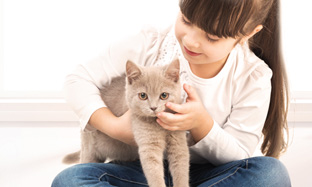
What nutritional needs for my kitten?
At 8 weeks, a kitten must eat 250 kcal per kg of body weight, which is proportionally 4 times more energy than an adult cat!
There is no question of feeding a kitten with a standard adult cat food: he needs a specific and rich diet in order to make the best start in life and help him develop harmoniously. Your kitten is still fragile and needs to be supported in order to face 3 imperatives: to grow harmoniously, to get used to digesting something other than breast milk and to obtain a competent immune system.
-The kitten’s rapid growth and its limited ingestion capacity (small stomach) require feeding him a high-fat diet to provide energy in concentrated form.
-Even more than an adult cat, a kitten needs a lot of animal protein, on one hand to satisfy its carnivorous diet, and on the other to cover all his needs in amino acid. A very good digestibility allows an optimal use of protein. Adding prebiotics, probiotics and clays will also help to limit digestive disorders, common in young cats.
-A diet rich in betaglucans (beer yeast extracts) helps to acquire the natural defences exclusive to the kitten, at the time when the immune protection provided by his mother gradually disappears.
After sterilization, the production of sex hormones drops and this new hormonal status can be accompanied by an increase in appetite and a decrease in energy needs of about 20%.
It is no longer a question of letting your kitten eat as much as before, as he risks to quickly gain weight.
After sterilization, adapt your cat’s diet to his new nutritional needs.
Most cats are neutered when they reach 6 months of age. At this stage, a kitten has of course not finished growing (growth usually stabilizes around 1 year, and more for some larger breeds): it is essential to provide him with all the elements needed to continue a healthy development, while still controlling the amount of energy he consumes every day. As the digestive system of the kitten is not yet fully mature, it is important to limit the amount of carbohydrates (starch), because he does not digest them very well.
The use of animal protein in large quantities covers the very high protein requirements of the kitten, still growing, and provides him with all the amino acids he needs.
As long as the growth is not done, the kitten needs high intakes of calcium, phosphorus, vitamins and other minerals in order to build strong bones. This is even more important for heavier cat breeds (ex: Maine Coon, Norwegian forest cat, Burmese cat…) where skeletal mineralization is longer than in lighter breeds, such as the Siamese.

